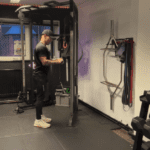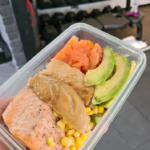Personal trainers and fitness enthusiasts are increasingly recognising the crucial role that gut health plays in overall wellness and athletic performance. A healthy gut microbiome can significantly impact various aspects of fitness, from energy levels and nutrient absorption to recovery and immune function.
The gut-fitness connection
The gut microbiome, consisting of trillions of microorganisms living in our digestive tract, plays a vital role in our overall health and fitness.
A well-balanced gut microbiome is associated with:
- Improved digestion and nutrient absorption.
- Enhanced energy metabolism.
- Better immune function.
- Reduced inflammation.
- Recovery from exercise.
- Improved mood and mental clarity.
These factors collectively contribute to better exercise performance, faster recovery, and more consistent training outcomes.
Optimising gut health for fitness
To support gut health and enhance fitness performance, Personal Trainers can guide their clients to:
- Diversify plant intake: Aim for 30+ different plant-based foods per week to promote microbial diversity. Include a rainbow of colourful fruits and vegetables. Add in whole grains, legumes, nuts and seeds into your meal plans.
- Incorporate fermented foods: Include probiotic-rich foods like yoghurt with live cultures, kefir, and fermented vegetables like sauerkraut and kimchi in the diet.
- Focus on fibre: Emphasise prebiotic-rich foods such as garlic, onions, asparagus, bananas, and oats to feed beneficial gut bacteria. These foods help introduce beneficial bacteria and feed existing gut microbes, prompting a healthy gut environment.
- Stay hydrated: Proper hydration supports overall gut function.
- Manage stress: Implement stress-reduction techniques, as stress can negatively impact gut health.
By implementing these gut-health strategies into fitness programs, you can achieve better overall health and improved athletic performance; this diversity supports a robust and balanced microbiome, which is essential for optimal health and fitness. Remember, a healthy gut is the foundation for a fit and thriving body.
Designing gut-friendly meal plans
When creating meal plans, focus on gut-supporting elements:
- Balance macronutrients with an emphasis on fibre-rich carbohydrates.
- Include lean proteins and healthy fats.
- Use fermented foods as sides or snacks.
- Aim for prebiotic-rich foods in recipes.
For example, a gut-friendly meal could be grilled salmon with quinoa and roasted vegetables, followed by a small serving of Greek yoghurt with berries.
Addressing hydration
Proper hydration is crucial for gut health. You would be encouraged to:
- Drink adequate water throughout the day.
- Consider probiotic-rich beverages like kefir or kombucha.
- Limit sugary drinks and excessive alcohol consumption.
Appropriate supplements
While whole foods should be the primary focus, certain supplements can support gut health:
- High-quality probiotic supplements.
- Prebiotic fibre supplements.
- Omega-3 fatty acids.
Always consult a healthcare professional before starting any new supplement regimen.
Monitoring and adjusting
We would advocate keeping a food diary/log to monitor progress and gut health status to:
- Track digestive symptoms and overall well-being.
- Adjust meal plans based on your responses and preferences.
Your food diary will allow you to identify potential gut irritants.
By integrating these strategies, you can effectively incorporate gut health into your nutrition plans, and your Personal Trainer can work with you to support both your fitness goals and overall wellness.
A personal trainer is an investment in your health and well-being that can lead to long-term positive effects on your fitness, confidence, and overall health. PT Hale prides itself on being a social and safe space where you can workout individually, or with like-minded people to get the results that you want and deserve – LET’S GO!











